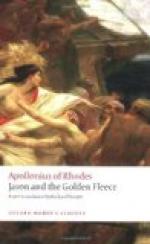[Footnote 2: [Greek: hos kai ton bibliothekon tou mouseiou axiothenai auton.]]
The principal event in his life, so far as we know, was the quarrel with his master Callimachus, which was most probably the cause of his condemnation at Alexandria and departure to Rhodes. This quarrel appears to have arisen from differences of literary aims and taste, but, as literary differences often do, degenerated into the bitterest personal strife. There are references to the quarrel in the writings of both. Callimachus attacks Apollonius in the passage at the end of the Hymn to Apollo, already mentioned, also probably in some epigrams, but most of all in his Ibis, of which we have an imitation, or perhaps nearly a translation, in Ovid’s poem of the same name. On the part of Apollonius there is a passage in the third book of the Argonautica (11. 927-947) which is of a polemical nature and stands out from the context, and the well-known savage epigram upon Callimachus.[1] Various combinations have been attempted by scholars, notably by Couat, in his Poesie Alexandrine, to give a connected account of the quarrel, but we have not data sufficient to determine the order of the attacks, and replies, and counter-attacks. The Ibis has been thought to mark the termination of the feud on the curious ground that it was impossible for abuse to go further. It was an age when literary men were more inclined to comment on writings of the past than to produce original work. Literature was engaged in taking stock of itself. Homer was, of course, professedly admired by all, but more admired than imitated. Epic poetry was out of fashion and we find many epigrams of this period—some by Callimachus—directed against the “cyclic” poets, by whom were meant at that time those who were always dragging in conventional and commonplace epithets and phrases peculiar to epic poetry. Callimachus was in accordance with the spirit of the age when he proclaimed “a great book” to be “a great evil,” and sought to confine poetical activity within the narrowest limits both of subject and space. Theocritus agreed with him, both in principle and practice. The chief characteristics of Alexandrianism are well summarized by Professor Robinson Ellis as follows: “Precision in form and metre, refinement in diction, a learning often degenerating into pedantry and obscurity, a resolute avoidance of everything commonplace in subject, sentiment or allusion.” These traits are more prominent in Callimachus than in Apollonius, but they are certainly to be seen in the latter. He seems to have written the Argonautica out of bravado, to show that he could write an epic poem. But the influence of the age was too strong. Instead of the unity of an Epic we have merely a series of episodes, and it is the great beauty and power of one of these episodes that gives the poem its permanent value—the episode of the love of Jason and Medea. This occupies the greater part of the




